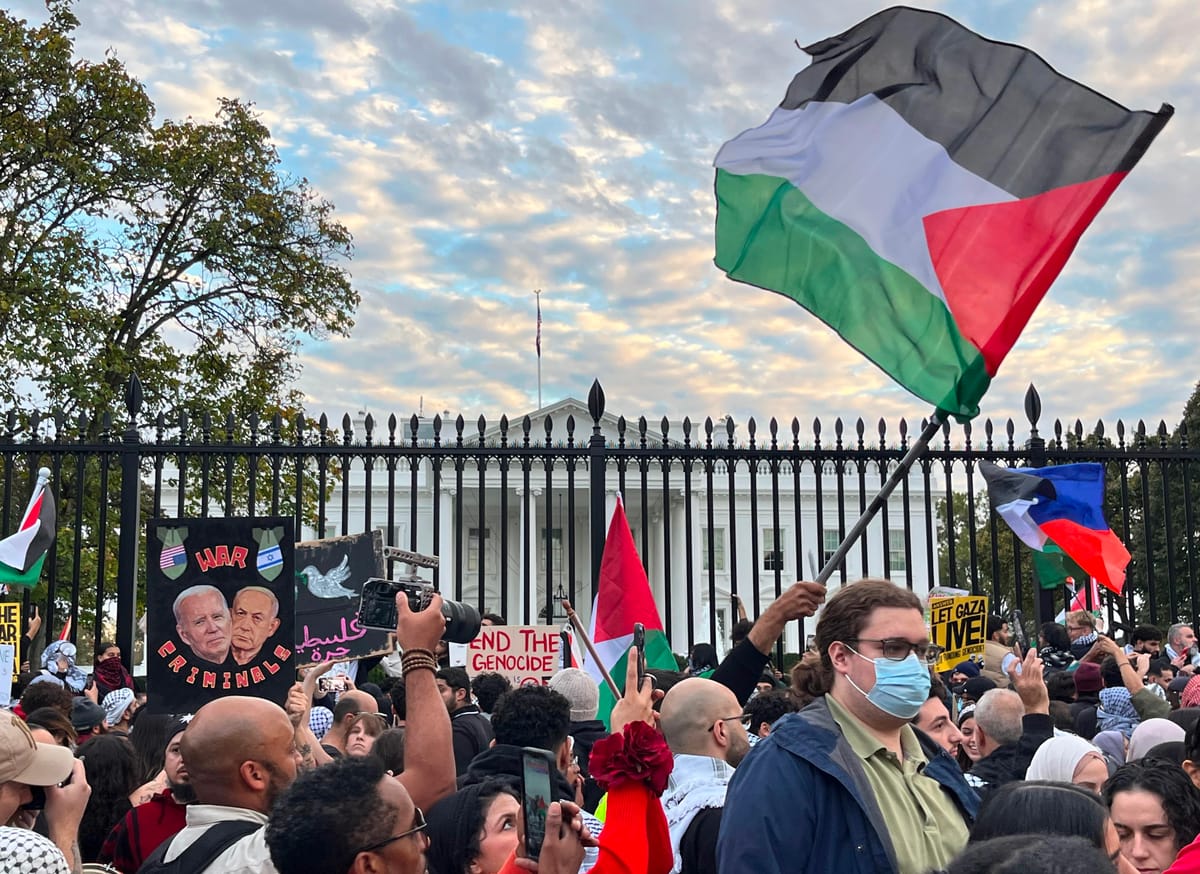Beyond Analogy: Fascism and the Morbid Symptoms of the Moment
Our current administration has normalized Trump with its pro-genocide and pro-fascist approach to Israel.


“What if our talk of fascism were not dominated by the question of analogy?” - Alberto Toscano, Late Fascism: Race, Capitalism and the Politics of Crisis
On Thursday, Texas Governor Greg Abbott pardoned a man who was convicted of killing 28-year-old Black Lives Matter protester Garrett Foster in the summer of 2020. Foster’s killer, Daniel S. Perry, was characterized as “basically a loaded gun” by psychiatric experts during the sentencing phase of his trial. Abbott’s pardon of Perry is reminiscent of so-called “driver immunity laws” in Florida, Iowa and Oklahoma, that extend legal protections to people who strike protesters with their cars. Legislators in at least 11 states have attempted to pass such legislation, effectively signaling their support for vigilantes, even when the bills themselves fail to become law. As Ruth Wilson Gilmore reminds us, our government does not simply maintain a monopoly on violence but also delegates violence. This has been the case throughout US history, as some people have been empowered to commit violence without consequence, while others have been condemned to endure it without recourse. These distinctions are felt most severely, and violence is exercised most enthusiastically when the status quo and those who benefit from it feel threatened.
In a 2018 blog post, composer Frank Wilhoit wrote:
Conservatism consists of exactly one proposition, to wit: There must be in-groups whom the law protects but does not bind, alongside out-groups whom the law binds but does not protect.
When I talk about fascism, people will often mention this quote. I understand why. It’s a well-formed explanation of why the liberal tendency to focus on conservative hypocrisy, rather than conservative hierarchy, is a failure of analysis. However, I do not believe the dynamic Wilhoit describes is limited to conservatism. Rather, I believe that dynamic represents the norms of white supremacy, capitalism, and empire, which are maintained by both Democrats and Republicans. When protests effectively challenge the status quo, we see Democratic mayors enforce these same norms by way of the most legitimized purveyors of such violence: police.
As I contemplate the fascist potential of the United States, in this historical moment, another quote comes to mind. In his book Late Fascism: Race, Capitalism and the Politics of Crisis, Alberto Toscano writes:
If fascism is also a product of the long history of ‘race wars’, then we cannot understand the fascist potentials of US nativism without attending, as [Nikhil Pal] Singh does, to the Indian Wars, and to the ways in which the settler-colonial organisation of dispossessive violence vested ‘ordinary citizens with an expansive police power’. Unlike classical European fascisms, US racial and settler-colonial fascism does not manifest univocally as the apotheosis of sovereignty, as a jackbooted Leviathan.
While Republicans are clearly the vanguard of a would-be fascist era, we can see the evolution of our fascist crisis in the actions of both Republicans and Democrats. We can see it in the bipartisan fortification of an increasingly deadly police state and the vigilante violence inflicted upon UCLA student protesters–attacks that raged on for hours as campus police, administrators, Los Angeles police, and the city’s Democratic mayor did nothing.
Democrats, such as Biden, have joined the chorus of delegitimization targeting Palestine solidarity protesters, as the president and mayors like Eric Adams repeat false claims that student protesters are violent and antisemitic. Such claims are efforts to legitimize the brutalization, arrest, and removal of student encampments–something we know billionaires have avidly lobbied to accomplish.
Anti-protest laws that legitimize violence against demonstrators, pardons for individuals who harm and kill protesters, and a hands-off approach to reactionary vigilantes, like the counter-protesters who attacked the Palestine solidarity encampment at UCLA on April 30, are all part of the same delegation of violence–which is becoming more explicit as fascism continues to ascend in the US. While Republicans are the vanguard of that rise, Democrats are also playing an active role in the hardening of fascist norms. As I write these words, Biden is defying the will of his own base during a contentious election year to facilitate a genocide perpetrated by a fascist government. If it sounds like I am making a dangerous false equivalency, please understand that I am not responsible for the erosion of popular distinctions between Biden and Trump. That is Biden’s work. Our current administration has normalized Trump with its pro-genocide and pro-fascist approach to Israel, its vilification of migrants and protesters, and its support for the violent suppression of dissent.
As Lily Greenberg, who resigned from her position within the U.S. Department of the Interior on Wednesday, due to Biden’s participation in Israel’s violence, told Ari Bloomekatz in an interview:
I was terrified of a Trump presidency and knew that I had to dedicate myself in 2020 to preventing that. And you know, I think that one thing that is so devastating about this is it seems like the President is not taking the threat of another Trump presidency seriously, because the political establishment is ignoring their constituents, which are the American people, 60% of whom want a cease-fire.
I have disagreed publicly with those who have characterized Biden as a fascist, and I remain wary of flattening the distinctions between an outwardly fascistic movement and the authoritarian lurch of neoliberalism. But the question of how we define one man's politics is less important than a meaningful analysis of the political conditions we are grappling with. Demagogues like Donald Trump do not usher in fascist transformations on their own. The fascist leanings of the United States are a response to ongoing social, economic, and environmental crises that both parties are navigating in their efforts to maintain capitalism. The established norms of liberal democracies are acceptable sacrifices to actors on both sides of the aisle. It is also crucial that we not understand the norms of liberal democracy as the ultimate inversion or natural opposite of fascism, but rather, as its historical and present-day incubator.
Fascistic practices are part of this country’s DNA and are embedded in the fabric of our society. Our torturous prison conditions, the racialized norms of our legal system, and a long history of racial violence at the hands of police and vigilantes are all evidence of the United States’ fascistic qualities. This country’s history of annihilatory violence toward marginalized populations is, in part, the basis for its existence–a fact not lost on modern-day fascists.
When I see photos of police descending on protesters at UCLA like stormtroopers, I am reminded that we cannot afford to restrict our analysis of fascism to the Republican Party. While Donald Trump is one of the most blatant political threats of our time, Democratic mayors are also building Cop Cities. In some cases, Democratic and Republican leaders have found alignment in their efforts to criminalize homelessness. Ramping up human disposability, enforcing our cooperation with the mass destruction of others, and enhancing the violence of police to manage dissent are all fascistic trends.
In a recent talk, Ruth Wilson Gilmore pushed back on the idea that Democrats lack vision, arguing that Democrats are seeking to “domesticate” elements of fascism. I find this argument compelling, as I do not believe we can afford to reduce the fight against fascism to electoral questions, such as whether to vote for Biden or Trump. To do so overlooks the larger crisis, and offers cover to elected officials whose policies would ultimately destroy us. As Gilmore wrote in 1992, in the paper Terror Austerity Race Gender Excess Theater:
The very crisis which we must exploit – the raw materials of profound social change – is the tending toward fascism through the romance of identity, forged in the always already of the American national project. Our work is to rearticulate our own connections in new (and frightening) forward-looking moves in order to describe, promote, organize, bargain in the political arenas.
It would be convenient if the trappings of fascism were wholly contained within the agenda of one party, just as it would be convenient if all evil housed itself in a fiery place called hell. Unfortunately, the morbid symptoms of the present are far more pervasive.
Organizing My Thoughts is a reader-supported newsletter. If you appreciate my work, please consider becoming a free or paid subscriber today. There are no paywalls for the essays, reports, interviews and excerpts published here. However, I could not do this work without the support of readers like you, so if you are able to contribute financially, I would greatly appreciate your help.




